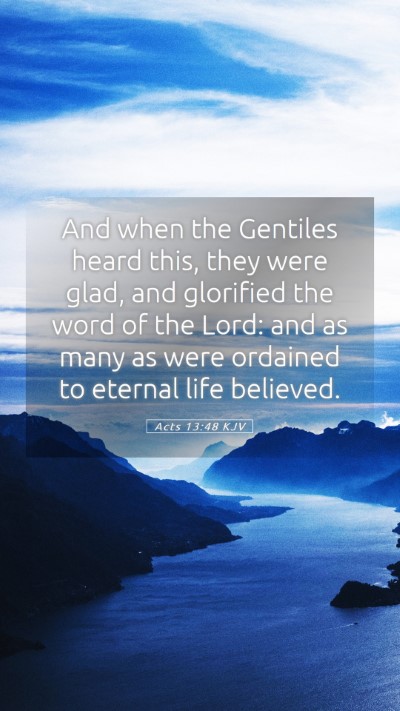Understanding Acts 13:48
Acts 13:48 states, "And when the Gentiles heard this, they were glad and glorified the word of the Lord: and as many as were ordained to eternal life believed." This verse holds significant weight in biblical scholarship, highlighting the interplay between divine sovereignty and human response to the gospel. Below, we explore various aspects of this verse, drawing insights from respected public domain commentaries.
Verse Context
This passage occurs in a pivotal moment in the early Church, where the Apostle Paul and his companion Barnabas are preaching the gospel to the Gentiles in Antioch. The reactions of the Gentiles demonstrate the expanding reach of salvation beyond the Jews. Understanding the cultural and historical context is vital for a comprehensive grasp of the verse.
Divine Sovereignty and Human Response
Commentaries by Matthew Henry, Albert Barnes, and Adam Clarke emphasize a balanced view of divine election and human belief showcased in this text. Acts 13:48 shows both God's initiative and the responsive faith of those who believe.
-
Matthew Henry's Commentary:
Henry points out the joyous reception of the Gentiles towards God's word, contrasting it with the rejection they faced from the Jewish leaders. He emphasizes that those “ordained to eternal life” signifies God's prior gracious decision to extend salvation, which corresponds with human acceptance.
-
Albert Barnes' Notes:
Barnes notes that "ordained" refers to a divine appointment or predestination to receive eternal life. This highlights the mystery of God’s sovereignty in choosing who would believe, further proving that not all will respond to the gospel, despite the universal offer of grace.
-
Adam Clarke's Commentary:
Clarke elucidates that this ordination does not negate human choice. Instead, it reveals the harmony between God’s purpose and man’s free will. The text underscores that God’s plans are fulfilled as those selected by Him respond affirmatively to the gospel message.
Key Themes
-
Joyful Acceptance:
The Gentiles’ gladness signifies the joy that accompanies the reception of the gospel. It reflects the broadening of God’s covenant to include all nations, fostering inclusivity within salvation.
-
Divine Ordination:
The concept of being “ordained” raises questions in theology about predestination and free will, indicating that God’s divine foreknowledge plays a crucial role in salvation.
Application to Daily Life
Understanding this verse has profound implications for believers today. It calls individuals to acknowledge that their faith is part of God’s greater plan and leads to the realization of the importance of sharing the gospel widely.
Cross-References
Acts 13:48 connects with several other scriptures, enhancing its understanding:
- John 6:37: "All that the Father gives me will come to me, and whoever comes to me I will never cast out." This verse highlights God's active role in coming to Him.
- Ephesians 1:4-5: "Even as he chose us in him before the foundation of the world, that we should be holy and blameless before him. In love, he predestined us for adoption..." It emphasizes the theme of divine selection for salvation.
- Romans 8:30: "And those whom he predestined he also called, and those whom he called he also justified…" This verse underscores the chain of redemption and divine purpose.
Conclusion
In summary, Acts 13:48 offers rich insights into the characteristics of God's grace, the joy of those who believe, and the theological discussions surrounding divine ordination and human initiative. For deeper Bible study insights, engaging with commentaries and resources enhances one’s grasp of Scripture and enriches personal faith journeys.


